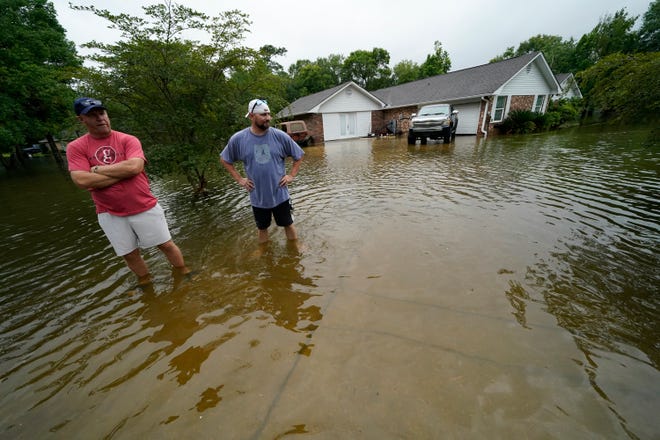
Tropical Storm Claudette drenched coastal areas of Louisiana, Mississippi and Alabama with heavy rain as it moved inland early Saturday, threatening flash floods, high winds and possible tornadoes.
At about 4 a.m. CT Saturday, the National Hurricane Center declared Claudette a tropical storm. Around that time, it was centered southwest of New Orleans with maximum sustained winds of 45 mph and was plodding northeast at 12 mph.
Claudette made landfall in southeast Louisiana just before 7 a.m. CT Saturday as heavy rains and tropical storm-force winds — at least 39 mph — continued along parts of the northern Gulf Coast, forcing cancellations of Juneteenth and Father's Day celebrations, according to the National Hurricane Center. The weather service announced at 10 a.m. CT that tropical storm-force winds are expected to continue along portions of the Gulf Coast for a few more hours.
The storm is expected to produce heavy rain of 5 to 10 inches with isolated maximum amounts of 15 inches across portions of the Central Gulf Coast and life-threatening flash floods across coastal Mississippi and Alabama, as well as the far western Florida Panhandle, the Weather Service said. Considerable flash, urban and small stream flooding is expected to continue through the weekend along the central Gulf Coast with floods spreading northeastward into the interior Southeast.

A tropical storm watch was issued Saturday morning for portions of the North Carolina coast, which may see tropical storm conditions Sunday night and Monday.
Tornado warnings were issued from the Mississippi coast to the western Florida panhandle with a tornado watch for parts of Alabama, Mississippi and the Florida panhandle. Along with flooding and tornadoes, there is a high risk of rip currents and high surf at beaches in affected areas near Gulf Coast shores.
Roughly 13,000 outages total across Louisiana, Mississippi and Alabama, according to poweroutage.us.
Claudette is expected to weaken to a tropical depression later Saturday before becoming a tropical storm again when it moves across the Carolinas Sunday night or early Monday.
Past Coverage:Tropical Storm Claudette forms, threatens to bring dangerous flooding to Gulf Coast
In Louisiana, Gov. John Bel Edwards declared a state of emergency Thursday and offered state resources to aid in storm response efforts. Louisiana was also hit hard by heavy rain and flooding last month when spring storms were blamed for multiple deaths.
Residents of Slidell, Louisiana, reported flooded streets. Slidell police said in a Facebook post that the flooding had largely receded by daybreak, after swamping as many as 50 cars and trucks with water and prompting multiple rescues from flooded cars, including the rescue of a woman "who was on her way to the hospital, possibly going into labor."
In Florida, the Pensacola area braced for heavy rain early Saturday morning with Escambia and Santa Rosa counties under tropical storm and flash flood warnings. As beaches close and multiple power outages have already impacted the counties, the area may be soaked in as much as 12 inches of rainfall beginning through the weekend.
Residents of Pace, Florida, called 911 to report a possible twister that tore the roofs off two homes and damaged at least three others.
“Nobody’s hurt,” said Sarah Whitfield, spokeswoman for Santa Rosa County, where the Florida homes were damaged. “We’re just thankful it happened after sunrise,” not overnight as people slept.
Possible tornadoes in Alabama damaged a fishing pier and flipped a mobile home, said Jason Beaman, a National Weather Service meteorologist in Mobile.
“We’ve got little squalls running through. It’ll rain really really hard for a few minutes and slack up for a few minutes,” said Glen Brannan of the Mobile County, Alabama, Emergency Management Agency early Saturday. “Just a lot of water on the roads.”
The weather system began as a broad area of low pressure in the southwestern Gulf of Mexico. It's the third storm of the 2021 season that began this month.
The National Oceanic and Atmospheric Administration has predicted 13 to 20 named storms will develop this season. This number includes tropical storms, which contain wind speeds of 39 mph or higher. Storms become hurricanes when winds reach 74 mph.
To prepare for a possible tropical storm, experts recommend restocking disaster kits to have medications and at least seven days of nonperishable food and three gallons of water for each person and pet. You can also prepare your yard by removing loose items, clearing loose and clogged rain gutters, and trimming trees and shrubs.
Contributing: The Associated Press; Diane Pantaleo and staff, Pensacola News Journal.
Contact News Now Reporter Christine Fernando at [email protected] or follow her on Twitter at @christinetfern.












